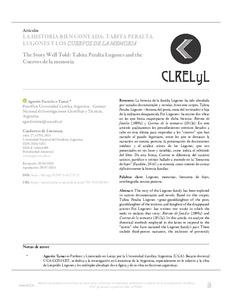Please use this identifier to cite or link to this item:
https://repositorio.uca.edu.ar/handle/123456789/20877| Título: | La historia bien contada: Tabita Peralta Lugones y los cuervos de la memoria | Autor: | Tamai, Agustín Francisco | Palabras clave: | AUTOBIOGRAFIA; Lugones, Leopoldo, 1874-1938; MEMORIA; FAMILIA | Fecha de publicación: | 2025 | Editorial: | Universidad Nacional del Nordeste | Resumen: | La historia de la familia Lugones ha sido abordada por variados documentales y novelas. Ante este corpus, Tabita Peralta Lugones –bisnieta del poeta, nieta del torturador e hija de la militante desaparecida Pirí Lugones– ha escrito dos obras en las que busca reapropiarse de dicha historia: Retrato de familia (2009a) y Cuervos de la memoria (2013a). En este artículo analizaremos los procedimientos retóricos llevados a cabo en esta última para responder a los “cuervos” que han narrado el pasado lugoniano, entre los que se destacan la narración en tercera persona, la presentación de documentos inéditos y el análisis crítico de los Lugones, que son presentados en sus luces y tinieblas, como indica el subtítulo del libro. De esta forma, Cuervos se diferencia del carácter satírico, paródico o irónico hallado a menudo en la “literatura de hijos” (Fandiño, 2016) y se muestra como intento de contar definitivamente la historia familiar. The story of the Lugones family has been explored in various documentaries and novels. Based on this corpus, Tabita Peralta Lugones –great-granddaughter of the poet, granddaughter of the torturer, and daughter of the disappeared activist Pirí Lugones– has written two works in which she seeks to reclaim that story: Retrato de familia (2009a) and Cuervos de la memoria (2013a). In this article, we analyze the rhetorical methods employed in the latter to respond to the “ravens” who have narrated the Lugones family’s past. These include third-person narration, the inclusion of previously unpublished documents, and a critical analysis of the Lugones family, portrayed in both its light and dark aspects, as suggested by the book’s subtitle. In this way, Cuervos differs from the satirical, parodic or ironic character often found in “literatura de hijos” (Fandiño, 2016) and is shown as an attempt to tell the family story definitively. |
URI: | https://repositorio.uca.edu.ar/handle/123456789/20877 | ISSN: | 0326-5102 | DOI: | 10.30972/clt.278722 | Derechos: | Atribución-NoComercial-CompartirIgual 4.0 Internacional | Fuente: | Cuadernos de Literatura. 2025 (27) |
| Appears in Collections: | Artículos |
Files in This Item:
| File | Description | Size | Format | |
|---|---|---|---|---|
| historia-bien-contada.pdf | 311,75 kB | Adobe PDF |  View/Open |
This item is licensed under a Creative Commons License

